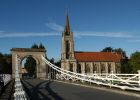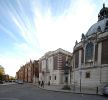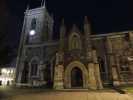Discover the...
Marlow Community Choir at Borlase
Edward Elgar - The Dream Of Gerontius
The Dream Of GeroniusThe Dream of Gerontius, Op. 38, is a work for voices and orchestra in two parts composed by Edward Elgar in 1900, to text from the poem by John Henry Newman. It relates the journey of a pious man's soul from his deathbed to his judgment before God and settling into Purgatory. Elgar disapproved of the use of the term "oratorio" for the work, though his wishes are not always followed. The piece is widely regarded as Elgar's finest choral work, and some consider it his masterpiece.
The work was composed for the Birmingham Music Festival of 1900; the first performance took place on 3 October 1900, in Birmingham Town Hall. It was badly performed at the premiere, but later performances in Germany revealed its stature. In the first decade after its premiere, the Roman Catholic dogma in Newman's poem caused difficulties in getting the work performed in Anglican cathedrals, and a revised text was used for performances at the Three Choirs Festival until 1910.
History
Elgar was not the first composer to consider setting John Henry Newman's poem "The Dream of Gerontius". Dvořák had considered it fifteen years earlier, and had discussions with Newman, before abandoning the idea.[1] Elgar knew the poem well. He had owned a copy since at least 1885, and in 1889 he was given another copy as a wedding present. This contained handwritten copies of extensive notes that had been made by General Gordon, and Elgar is known to have considered the text in musical terms for several years.[2] Throughout the 1890s, Elgar had composed several large-scale works for the regular festivals that were a key part of Britain's musical life. In 1898, based on his growing reputation, he was asked to write a major work for the 1900 Birmingham Triennial Music Festival.[3] He was unable to start work on the poem that he knew so well until the autumn of 1899, and did so only after first considering a different subject.
Composition proceeded quickly. Elgar and August Jaeger, his editor at the publisher Novello, exchanged frequent, sometimes daily, letters,[5] which show how Jaeger helped in shaping the work, and in particular the climactic depiction of the moment of judgment.[6] By the time Elgar had completed the work and Novello had printed it, there were only three months to the premiere. The Birmingham chorus, all amateurs, struggled to master Elgar's complex, demanding and somewhat revolutionary work. Matters were made worse by the sudden death of the chorus master and his replacement by an elderly musician who found the music beyond him.[7] The conductor of the premiere, Hans Richter, received a copy of the full score only on the eve of the first orchestral rehearsal.[8] The soloists at the Birmingham Festival on 3 October 1900 were Marie Brema, Edward Lloyd and Harry Plunket Greene.[9] The first performance was, famously, a near disaster. The choir could not sing the music adequately, and two of the three soloists were in poor voice.[10] Elgar was deeply upset at the debacle, telling Jaeger, "I have allowed my heart to open once – it is now shut against every religious feeling & every soft, gentle impulse for ever."[11] However, many of the critics could see past the imperfect realisation and the work became established in Britain[12][13] once it had had its first London performance in 1903, at the Roman Catholic Westminster Cathedral.
Shortly after the premiere, the German conductor and chorus master Julius Buths made a German translation of the text and arranged a successful performance in Düsseldorf on 19 December 1901. Elgar was present, and he wrote "It completely bore out my idea of the work: the chorus was very fine".[15] Buths presented it in Düsseldorf again on 19 May 1902 in conjunction with the Lower Rhenish Music Festival.[16] The soloists included Muriel Foster, and Elgar was again in the audience, being called to the stage twenty times to receive the audience's applause.[17] Buths's festival co-director Richard Strauss was impressed enough by what he heard that at a post-concert banquet he said: "I drink to the success and welfare of the first English progressive musician, Meister Elgar".[16] This greatly pleased Elgar,[17] who considered Strauss to be "the greatest genius of the age".
The strong Roman Catholicism of the work gave rise to objections in some influential British quarters; some Anglican clerics insisted that for performances in English cathedrals Elgar should modify the text to tone down the Roman Catholic references. There was no Anglican objection to Newman's words in general: Arthur Sullivan's setting of his "Lead, Kindly Light", for example, was sung at Westminster Abbey in 1904.[19] Disapproval was reserved for the doctrinal aspects of "The Dream of Gerontius" repugnant to Anglicans, such as Purgatory.[20] Elgar was unable to resist the suggested bowdlerisation, and in the ten years after the premiere the work was given at the Three Choirs Festival with an expurgated text.[21] The Dean of Gloucester refused admission to the work until 1910.[22][23] This attitude lingered until the 1930s, when the Dean of Peterborough banned the work from the cathedral.[24] Elgar was also faced with many people's assumption that he would use the standard hymn tunes for the sections of the poem that had already been absorbed into Anglican hymn books: "Firmly I believe and truly", and "Praise to the Holiest in the Height".
The Dream of Gerontius received its US premiere on 23 March 1903 at The Auditorium, Chicago, conducted by Harrison M. Wild. It was given in New York, conducted by Walter Damrosch three days later.[25] It was performed in Sydney, in 1903.[25] The first performance in Vienna was in 1905;[26] the Paris premiere was in 1906;[27] and by 1911 the work received its Canadian premiere in Toronto under the baton of the composer.
In the first decades after its composition leading performers of the tenor part included Gervase Elwes and John Coates, and Louise Kirkby Lunn, Elena Gerhardt and Julia Culp were admired as the Angel. Later singers associated with the work include Muriel Foster, Clara Butt, Kathleen Ferrier, and Janet Baker as the Angel, and Heddle Nash, Steuart Wilson and Richard Lewis as Gerontius.
The work has come to be generally regarded as Elgar's finest choral composition. The Grove Dictionary of Music and Musicians rates it as "one of his three or four finest works", and the authors of The Record Guide, writing in 1956 when Elgar's music was comparatively neglected, said, "Anyone who doubts the fact of Elgar's genius should take the first opportunity of hearing The Dream of Gerontius, which remains his masterpiece, as it is his largest and perhaps most deeply felt work."[28] In the Oxford Dictionary of National Biography, Michael Kennedy writes, "[T]he work has become as popular with British choral societies as Messiah and Elijah, although its popularity overseas did not survive 1914. Many regard it as Elgar's masterpiece. ... It is unquestionably the greatest British work in the oratorio form, although Elgar was right in believing that it could not accurately be classified as oratorio or cantata."
Synopsis
Newman's poem tells the story of a soul's journey through death, and provides a meditation on the unseen world of Roman Catholic theology. Gerontius (a name derived from the Greek word geron, "old man") is a devout Everyman.[12][29] Elgar's setting uses most of the text of the first part of the poem, which takes place on Earth, but omits many of the more meditative sections of the much longer, otherworldly second part, tightening the narrative flow.
In the first part, we hear Gerontius as a dying man of faith, by turns fearful and hopeful, but always confident. A group of friends (also called "assistants" in the text) joins him in prayer and meditation. He passes in peace, and a priest, with the assistants, sends him on his way with a valediction. In the second part, Gerontius, now referred to as "The Soul", awakes in a place apparently without space or time, and becomes aware of the presence of his guardian angel, who expresses joy at the culmination of her task (Newman conceived the Angel as male, but Elgar gives the part to a female singer). After a long dialogue, they journey towards the judgment throne.
They safely pass a group of demons, and encounter choirs of angels, eternally praising God for His grace and forgiveness. The Angel of the Agony pleads with Jesus to spare the souls of the faithful. Finally Gerontius glimpses God and is judged in a single moment. The Guardian Angel lowers Gerontius into the soothing lake of Purgatory, with a final benediction and promise of a re-awakening to glory.
Music
The work calls for a large orchestra of typical late Romantic proportions, double chorus with semichorus, and usually three soloists. Gerontius is sung by a tenor, and the Angel is a mezzo-soprano. The Priest's part is written for a baritone, while the Angel of the Agony is more suited to a bass; as both parts are short they are usually sung by the same performer, although some performances assign different singers for the two parts.
The choir plays several roles: attendants and friends, demons, Angelicals (women only) and Angels, and souls in Purgatory. They are employed at different times as a single chorus in four parts, or as a double chorus in eight parts or antiphonally. The semichorus is used for music of a lighter texture; usually in performance they are composed of a few members of the main chorus; however, Elgar himself preferred to have the semi-chorus placed near the front of the stage.
The required instrumentation comprises two flutes (II doubling piccolo), two oboes and cor anglais, two clarinets in B♭ and A and bass clarinet, two bassoons and contrabassoon, four horns, three trumpets, three trombones, tuba, timpani plus three percussion parts, harp, organ, and strings. Elgar called for an additional harp if possible, plus three additional trumpets (and any available percussionists) to reinforce the climax in Part II, just before Gerontius's vision of God.
Each of the two parts is divided into distinct sections, but differs from the traditional oratorio in that the music continues without significant breaks. Elgar did not call the work an oratorio, and disapproved when other people used the term for it.[30] Part I is approximately 35 minutes long and Part II is approximately 60 minutes.
- Part I:
- Prelude
- Tenor Solo (Gerontius) Jesu, Maria, – I am near to death
- Chorus (Assistante) Kyrie Eleison
- Tenor Solo (Gerontius) Rouse thee, my fainting soul
- Chorus (Assistante) Be merciful, be gracious; spare him, Lord
- Tenor Solo (Gerontius) Sanctus fortis, sanctus Deus
- Tenor Solo (Gerontius) I can no more
- Chorus (Assistante) Rescue him, O Lord, in this his evil hour
- Tenor Solo (Gerontius) Novissima hora est
- Bass solo (The Priest) Proficiscere, anima Christiana
- Chorus (Assistante) Go, in the name Of Angels and Archangels
- Part II:
- Introduction
- Tenor Solo (Gerontius) I went to sleep; and now I am refreshed
- Mezzo-Soprano Solo (Angel) My work is done, My task is o'er
- Dialogue, Mezzo-Soprano and Tenor (Angel & Soul) All hail, My child and brother, hail!
- Chorus (Demons) Lowborn clods of brute earth
- Mezzo-Soprano Solo (Angel) It is the restless panting of their being
- Chorus (Demons) The mind bold and independent
- Dialogue, Tenor and Mezzo-Soprano (Soul & Angel) I see not those false spirits
- Chorus (Angelicals) Praise to the Holiest in the height
- Tenor Solo (Soul) The sound is like the rushing of the wind
- Chorus (Angelicals) Glory to him
- Mezzo-Soprano Solo (Angel) They sing of thy approaching agony
- Tenor Solo (Soul) But hark! a grand mysterious harmony
- Mezzo-Soprano Solo (Angel) And now the threshold as we traverse it
- Chorus (Tutti) Praise to the Holiest in the height
- Dialogue, Mezzo-Soprano and Tenor (Angel & Soul) Thy judgement now is near
- Bass Solo (Angel of Agony) Jesu! By that shuddering dread which fell on thee
- Chorus (Voices On Earth) Be merciful, be gracious, spare him, Lord
- Mezzo-Soprano Solo (Angel) Praise to his name
- Tenor Solo (Soul) Take me away
- Chorus (Souls in Purgatory) Lord, Thou hast been our refuge
- Mezzo-Soprano Solo (Angel) Softly and gently, dearly ransomed soul
- Chorus (Souls) Lord, Thou hast been our refuge
- Chorus (Angelicals) Praise to the holiest








